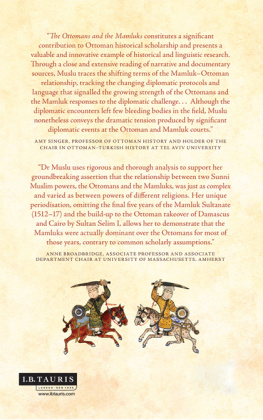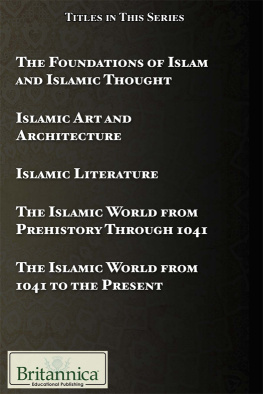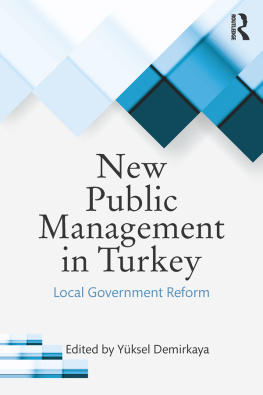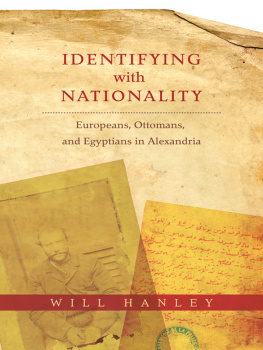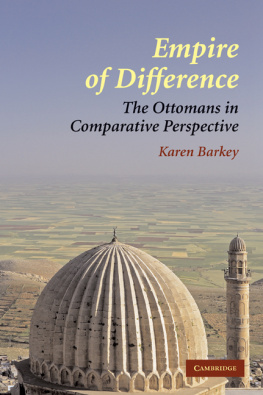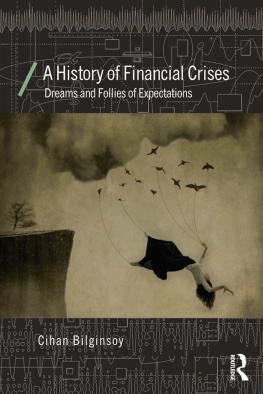Cihan Yüksel Muslu - The Ottomans and the Mamluks
Here you can read online Cihan Yüksel Muslu - The Ottomans and the Mamluks full text of the book (entire story) in english for free. Download pdf and epub, get meaning, cover and reviews about this ebook. publisher: I.B.Tauris, genre: Religion. Description of the work, (preface) as well as reviews are available. Best literature library LitArk.com created for fans of good reading and offers a wide selection of genres:
Romance novel
Science fiction
Adventure
Detective
Science
History
Home and family
Prose
Art
Politics
Computer
Non-fiction
Religion
Business
Children
Humor
Choose a favorite category and find really read worthwhile books. Enjoy immersion in the world of imagination, feel the emotions of the characters or learn something new for yourself, make an fascinating discovery.
- Book:The Ottomans and the Mamluks
- Author:
- Publisher:I.B.Tauris
- Genre:
- Rating:4 / 5
- Favourites:Add to favourites
- Your mark:
- 80
- 1
- 2
- 3
- 4
- 5
The Ottomans and the Mamluks: summary, description and annotation
We offer to read an annotation, description, summary or preface (depends on what the author of the book "The Ottomans and the Mamluks" wrote himself). If you haven't found the necessary information about the book — write in the comments, we will try to find it.
The Ottomans and the Mamluks — read online for free the complete book (whole text) full work
Below is the text of the book, divided by pages. System saving the place of the last page read, allows you to conveniently read the book "The Ottomans and the Mamluks" online for free, without having to search again every time where you left off. Put a bookmark, and you can go to the page where you finished reading at any time.
Font size:
Interval:
Bookmark:

Cihan Yksel Muslu is Assistant Professor at the University of Texas at Dallas and holds a PhD in History and Middle Eastern Studies from Harvard University.
THE OTTOMANS
AND THE
MAMLUKS
Imperial Diplomacy and Warfare in the
Islamic World
C HAN Y KSEL M USLU

Published in 2014 by I.B.Tauris & Co. Ltd
6 Salem Road, London W2 4BU
175 Fifth Avenue, New York NY 10010
www.ibtauris.com
Distributed in the United States and Canada
Exclusively by Palgrave Macmillan
175 Fifth Avenue, New York NY 10010
Copyright 2014 Cihan Yksel Muslu
The right of Cihan Yksel Muslu to be identified as the author of this work has been asserted by the author in accordance with the Copyright, Designs and Patents Act 1988.
All rights reserved. Except for brief quotations in a review, this book, or any part thereof, may not be reproduced, stored in or introduced into a retrieval system, or transmitted, in any form or by any means, electronic, mechanical, photocopying, recording or otherwise, without the prior written permission of the publisher.
Library of Ottoman Studies 36
ISBN: 978 1 78076 149 7
eISBN: 978 0 85773 580 5
A full CIP record for this book is available from the British Library
A full CIP record is available from the Library of Congress
Library of Congress Catalog Card Number: available
Typeset in Garamond Three by OKS Prepress Services, Chennai, India
Benimle beraber ikinci doktoralarn bitiren sevgili Annem Semahat
(enaltan) Yksele ve Babam brahim Aydn Yksele
CONTENTS
A NOTE ON THE BOOK AND
TRANSLITERATION
Those readers interested in further information about the embassies I discuss in the book should consult Appendix III for additional details about these and other cases I was not able to include in the main text.
For OttomanTurkish words, modern Turkish spelling and orthography are used.
For the words from the Mamluk context, all transliteration will be eliminated, except for the ayn and hamza.
For the sake of consistency, those words denoting terms, places, and people of the Islamic world (i.e. the Karamanids) that are going to form a part of Ottoman lands (except for Mamluk lands of course), the slightly Turkified version of the common forms in English will be used (i.e. the Karamanids instead of Qaramanids and Karamanoullar). As for the names of their rulers (i.e. the Karamanids, etc.), the Turkish spelling and orthography is used, considering that eventually they were subdued by the Ottomans.
For the names of the Dulkadirid rulers, forms in English (Shahbudaq, Shahsuwar, Ala al-Dawla) are used, with the exception of Nasir al-din Mehmed Bey. Instead of Muhammad, Mehmed is preferred.
For those words denoting terms, places, and people of the Islamic realm that never formed a part of either the Ottoman or Mamluk lands, all transliteration will be eliminated, except for the ayn and hamza (for instance, Shah smail).
If there is an accepted English name for a city or region, this has been preferred (Damascus, Cairo, etc.). If there is no accepted English rendering for a city or region, then the familiar forms are used, such as Kayseri, Malatya (with one exception: I prefer Constantinople instead of Istanbul).
ACKNOWLEDGEMENTS
While it would be impossible to name every individual who has been involved in this project, I would like to thank many of those who have helped me during this long journey. First, I would like to acknowledge the friendly and accommodating staffs of Dar al-Kutub, the Sleymaniye Library, the Topkap Palace Archive, the Topkap Palace Library, and the Babakanlk Archive.
By granting me a research fellowship, Ko Universitys Research Center for Anatolian Civilizations (RCAC) in Istanbul, Turkey allowed me to radically revise and expand my dissertation into this book. I thank them for this amazing opportunity to spend an entire academic year at their beautiful research center near such important archives and manuscript libraries. More than funding, this fellowship offered me an intellectual home during my stay in Istanbul and surrounded me with a vibrant and enthusiastic group of advanced scholars and graduate students. I am particularly thankful to the staff and to Scott Redford, RCACs supportive director, who made this stay a very pleasant and memorable experience for my family and me. During the initial phase of this project, I also received financial and intellectual support from Harvard University, where I was granted a dissertation completion fellowship in 20056. I am also indebted to the generous fellowship of Trk Petrol Vakf that funded my stay in Egypt. Its director Uur Derman (now retired) has always been an adamant supporter of my work.
I am grateful to the administration at UT Dallas, particularly to Dean Dennis Kratz and Associate Dean Michael Wilson, who allowed me to take time off in my second year as a tenure-track assistant professor to take advantage of the RCAC fellowship. My special thanks go to the Interlibrary Loan staff of McDermott Library. The endless friendship, generous professional advice, and humor of my colleagues both encouraged and focused me.
My countless conversations with Cemal Kafadar on Ottoman history, research, and writing continued even after I completed my dissertation. From the inception of this project to its end, he has encouraged me to believe in my work, and his mentorship has been invaluable. Likewise, the guidance of Glru Necipolu Kafadar at significant times during this project was enlightening. I particularly appreciate the guidance of Jane Hathaway who always found time for me in the midst of her demanding schedule.
While revising the manuscript, I particularly benefitted from the professional comments of Frdric Bauden, Doris Behrens-Abouseif, Ann Broadbridge, Malika Dekkiche, Leslie Pierce, Amy Singer, and Derin Terziolu, who all read parts of this book at various stages. Their suggestions substantially improved my work. My local editor Sharon Duncan tirelessly polished my writing. Tomasz Hoskins, my editor at I.B.Tauris, always believed in this project. The patient and timely responses of Allison Walker, my production editor at I.B.Tauris, were encouraging for a first-time author. I am also grateful for the feedback I received from the anonymous reader who was a part of my review process at I.B.Tauris.
I am equally grateful to those who were closely involved in this project during its early phases when I was a graduate student at Harvard University. The support and intellectual guidance of Roy Mottahedeh, Michael Winter, and Hakan Karateke never faltered during those years. The guidance of Ekmeleddin hsanolu, who was at that time the director of the Research Centre for Islamic History, Art and Culture, enabled me to build contacts with scholars such as Ayman Fuad Sayyid, who helped make my stay in Cairo both pleasurable and productive. The libraries of the French Institute and the American University of Cairo became my intellectual homes in Cairo. Finally, I cannot forget the timely help of Yusuf Kkda in 2003.
My family and friends have shared with me both the pleasure and the agony of writing. Volkan Muslu has always believed that I could finish. My daughter, Dilara Muslu, has not only enriched my life but has also inspired me to dedicate myself to both my career and to her future. At the last stage of this project, I was blessed with the arrival of my son Emre Muslu. His presence convinced me that it is time to finish this project. My extended familyfrom my (now late) grandmother Hasibe enaltan to aunts, cousins, and my childhood friendshave always supported me with their prayers and love.
Next pageFont size:
Interval:
Bookmark:
Similar books «The Ottomans and the Mamluks»
Look at similar books to The Ottomans and the Mamluks. We have selected literature similar in name and meaning in the hope of providing readers with more options to find new, interesting, not yet read works.
Discussion, reviews of the book The Ottomans and the Mamluks and just readers' own opinions. Leave your comments, write what you think about the work, its meaning or the main characters. Specify what exactly you liked and what you didn't like, and why you think so.

